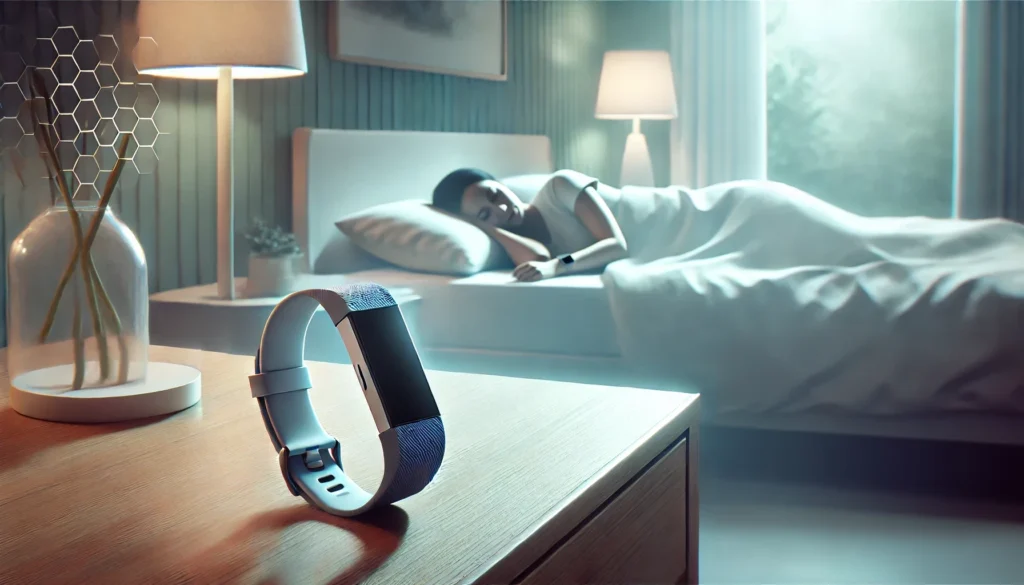Getting a good night’s sleep is essential for overall health and wellness, yet many of us struggle to achieve it consistently. In our quest for better sleep, technology offers a myriad of solutions, including a plethora of sleep tracking apps. These apps not only monitor your sleep patterns but also provide insights that can help you improve your sleep quality.
In this article, we delve into the world of free sleep tracking apps, exploring their features, benefits, and how they can aid you in your journey towards restorative slumber.
You May Also Like: Ultimate Guide to Sleep Tracker Apps
The Importance of Sleep Tracking
Before we dive into specific apps, it’s crucial to understand why sleep tracking is important. Sleep is a complex physiological process, and disruptions can affect not only your restfulness but also your cognitive function, emotional regulation, and overall health. By tracking your sleep, you can identify patterns and disturbances, allowing you to make informed changes to your habits or environment.
Understanding Sleep Stages
Sleep is divided into various stages, including light sleep, deep sleep, and REM sleep. Each stage has its own unique physiological characteristics and plays a significant role in your overall health. For instance, deep sleep is crucial for physical recovery, while REM sleep is essential for emotional regulation and memory processing. Sleep tracking helps you understand how much time you spend in each stage, providing insights into the quality of your rest.
Identifying Sleep Disruptors
Many factors can disrupt your sleep, from stress and diet to environmental noise and light. Sleep tracking apps can help you pinpoint specific disruptors by correlating disturbances in your sleep data with external factors. Understanding these disruptors allows you to take targeted actions, such as altering your sleep environment or adjusting your lifestyle habits, to enhance your sleep quality.
Long-Term Health Benefits
Consistently tracking your sleep can lead to significant long-term health benefits. By making informed adjustments based on your sleep data, you can reduce the risk of chronic conditions associated with poor sleep, such as cardiovascular diseases and mental health disorders. Moreover, improved sleep quality can enhance your daily performance, cognitive function, and emotional resilience, contributing to a healthier life overall.
The Role of Technology
Modern sleep tracking apps leverage advanced technology, such as accelerometers and heart rate sensors, to monitor your sleep with remarkable accuracy. These technologies enable apps to capture subtle changes in your sleep patterns, providing comprehensive insights into your sleep quality. As technology continues to evolve, sleep tracking apps are becoming increasingly sophisticated, offering more personalized recommendations for improving your sleep.

Best Free Sleep Tracker Apps
Sleep Cycle
Sleep Cycle is one of the most popular sleep tracking apps available today. It uses a patented sound analysis technology to monitor your sleep patterns and movements, waking you up at the optimal time in your sleep cycle. This feature is designed to ensure you wake up feeling refreshed and ready to tackle the day.
Smart Alarm Clock
The Smart Alarm Clock feature in Sleep Cycle is designed to wake you up during your lightest sleep phase. This is crucial because waking up during deep sleep can leave you feeling groggy and disoriented. By targeting lighter sleep phases, the app helps you start your day with more energy and alertness.
Detailed Sleep Analysis
Sleep Cycle provides detailed sleep statistics and graphs, offering insights into your sleep duration, quality, and patterns. These visual representations make it easier to understand your sleep trends over time and identify areas for improvement. The app also allows you to track your sleep efficiency, helping you optimize your sleep schedule.
Sleep Notes
The Sleep Notes feature lets you record daily activities and see how they affect your sleep quality. By noting factors such as caffeine intake, exercise, and stress levels, you can identify patterns that may be impacting your sleep. This information empowers you to make positive changes to your lifestyle for better sleep.
Sleep as Android
For Android users, Sleep as Android offers a comprehensive sleep tracking experience. This app integrates seamlessly with wearable devices and provides a range of features aimed at improving sleep quality.
Precise Sleep Cycle Tracking
Sleep as Android utilizes sonar technology for precise sleep cycle monitoring. This innovative approach allows the app to detect subtle movements and changes in your sleep patterns, offering a detailed understanding of your sleep cycles. The app’s accuracy makes it a valuable tool for tracking and enhancing your sleep quality.
Snore Detection and Solutions
The app’s snore detection feature identifies snoring episodes and offers sound recordings for analysis. By understanding the extent and impact of snoring on your sleep, you can take steps to address the issue, such as using anti-snoring devices or adjusting your sleeping position. The app also provides gentle sound cues to help reduce snoring.
Integration with Smart Home Devices
Sleep as Android is compatible with various smart home devices and wearables, allowing for seamless integration into your daily routine. This feature enables you to automate your sleep environment, such as adjusting room temperature or lighting, to create the optimal conditions for restful sleep.
Pillow
Pillow is a versatile sleep tracking app available for iOS users. It combines a sleek interface with robust features to help you understand and improve your sleep.
Automatic Sleep Detection
Pillow’s automatic sleep detection feature records sleep sessions without requiring manual input. This convenience ensures that your sleep data is consistently tracked, providing a comprehensive overview of your sleep patterns. The app’s automatic detection minimizes the risk of missing important sleep data.
Heart Rate Analysis
Pillow offers insights into heart rate variability during sleep, providing a deeper understanding of your sleep quality. By analyzing changes in your heart rate, the app can indicate how restful your sleep is and identify potential stressors affecting your sleep. This information can guide you in making lifestyle adjustments for better sleep health.
Personalized Sleep Recommendations
Based on your sleep data, Pillow provides personalized insights and tips for improving your sleep. These recommendations are tailored to your unique sleep patterns and lifestyle, offering actionable advice for enhancing your sleep quality. By following these suggestions, you can achieve more restorative sleep and overall well-being.
Choosing the Right Sleep App
With numerous sleep tracking apps available, selecting the right one can be overwhelming. Here are some factors to consider:
Compatibility with Devices
Ensure the app you choose is compatible with your smartphone and any wearable devices you use. Many apps offer specific features tailored to either Android or iOS platforms. Compatibility with your existing devices ensures a seamless user experience and maximizes the app’s functionality.
Essential Features
Consider what features are most important to you. Are you looking for detailed sleep analysis, smart alarms, or integration with other health apps? Prioritize apps that align with your specific needs. For instance, if you value integration with fitness trackers, choose an app that syncs with your devices for comprehensive health monitoring.
User Experience and Interface
Ease of use is crucial for maintaining consistent sleep tracking habits. Choose an app with an intuitive interface and easy-to-understand data presentation. A user-friendly design encourages regular use and helps you make sense of your sleep data, empowering you to make informed decisions about your sleep health.
Data Privacy and Security
Be mindful of how your data is stored and used. Opt for apps with transparent privacy policies and robust data protection measures. Ensuring your personal data is secure and used responsibly is essential for maintaining your privacy and trust in the app.
Cost and Subscription Options
While many sleep tracking apps offer free versions, some features may require a subscription. Evaluate the cost and benefits of premium features to determine if they are worth the investment. Consider whether the free version meets your needs or if the additional features justify the expense.

The Science Behind Sleep Tracking
Understanding the science behind sleep tracking can deepen your appreciation for these apps. Sleep is composed of several stages, including REM (rapid eye movement) and non-REM sleep. Each stage plays a vital role in physical restoration and cognitive processing.
Exploring Sleep Cycles
Sleep cycles are composed of different stages that repeat throughout the night. Understanding these cycles is crucial for interpreting your sleep data. Each cycle typically lasts about 90 minutes and includes both non-REM and REM sleep stages. Sleep tracking apps help you visualize how these cycles unfold during the night, providing insights into your sleep quality.
The Significance of REM and Non-REM Sleep
REM sleep is associated with dreaming and plays a crucial role in emotional regulation and memory consolidation. Non-REM sleep, including deep sleep, is essential for physical recovery and growth. By analyzing the proportion of REM and non-REM sleep, you can identify imbalances that may affect your health and take steps to achieve a more balanced sleep cycle.
Correlating Sleep Data with Lifestyle Factors
Sleep tracking apps allow you to correlate your sleep data with lifestyle factors such as diet, exercise, and stress levels. By understanding how these factors influence your sleep, you can make informed changes to improve your sleep quality. This holistic approach empowers you to optimize your lifestyle for better health and well-being.
Future Trends in Sleep Technology
As technology evolves, so do the capabilities of sleep tracking apps. Future trends may include more advanced biometric sensors, AI-driven insights, and enhanced integration with smart home ecosystems. These advancements promise even more personalized and actionable sleep insights.
Advanced Biometric Sensors
Future sleep tracking apps may incorporate advanced biometric sensors capable of measuring additional physiological parameters, such as skin temperature and oxygen saturation. These sensors can provide a more comprehensive picture of your sleep health, offering deeper insights into your sleep quality and potential health issues.
AI-Driven Sleep Insights
The integration of artificial intelligence in sleep tracking apps can lead to more personalized and predictive sleep insights. AI algorithms can analyze vast amounts of sleep data to identify patterns and recommend tailored interventions. These insights can help you anticipate sleep disturbances and make proactive changes to your sleep routine.
Smart Home Integration
Enhanced integration with smart home ecosystems allows sleep tracking apps to automate your sleep environment for optimal rest. Features such as adjusting room temperature, controlling lighting, and managing noise levels can be seamlessly integrated into your sleep routine, creating a more conducive environment for restful sleep.
Predictive Sleep Interventions
Future apps may offer predictive sleep interventions based on your sleep data and lifestyle patterns. By identifying potential sleep disruptors in advance, these apps can recommend specific changes, such as adjusting your bedtime or modifying your evening routine, to enhance your sleep quality.
Practical Tips for Better Sleep
In addition to using sleep tracking apps, here are some practical tips to enhance your sleep quality:
Create a Consistent Sleep Schedule
Going to bed and waking up at the same time each day helps regulate your body’s internal clock. Consistency reinforces your natural sleep-wake cycle, making it easier to fall asleep and wake up refreshed. Aim to maintain a regular schedule even on weekends to optimize your sleep health.
Optimize Your Sleep Environment
Ensure your bedroom is cool, dark, and quiet. Consider using blackout curtains or a white noise machine to minimize disturbances. Creating a comfortable sleep environment reduces the likelihood of interruptions and promotes deeper, more restorative sleep.
Limit Screen Time Before Bed
The blue light emitted by screens can interfere with your body’s melatonin production. Try to avoid screens at least an hour before bedtime to enhance your sleep quality. Instead, engage in relaxing activities such as reading or meditation to prepare your mind for sleep.
Practice Relaxation Techniques
Techniques such as deep breathing, meditation, or progressive muscle relaxation can help ease you into sleep. Incorporating relaxation practices into your bedtime routine reduces stress and anxiety, making it easier to fall asleep and enjoy restful sleep.
Monitor Your Diet and Exercise
Be mindful of your diet and exercise habits, as they can significantly impact your sleep quality. Avoid consuming caffeine or heavy meals close to bedtime, and engage in regular physical activity to promote better sleep. Maintaining a healthy lifestyle supports your overall sleep health and well-being.

Conclusion
In our fast-paced world, achieving quality sleep is more important than ever. Free sleep tracking apps offer a convenient and effective way to monitor and improve your sleep patterns. By understanding your sleep data and making informed changes, you can enhance your overall health and well-being.
Whether you are a health and wellness coach, science journalist, or biohacker, leveraging these apps can provide valuable insights into your sleep habits, empowering you to make positive changes. As technology continues to advance, the future of sleep tracking holds exciting possibilities for enhancing our understanding of sleep and its impact on our lives.
Further Reading:
How the Best Sleep Tracker App Can Help You Get the Sleep You Need
We Found the Best Fitness Trackers After Monitoring Our Runs, Walks, and More
Important Note: The information contained in this article is for general informational purposes only, and should not be construed as health or medical advice, nor is it intended to diagnose, prevent, treat, or cure any disease or health condition. Before embarking on any diet, fitness regimen, or program of nutritional supplementation, it is advisable to consult your healthcare professional in order to determine its safety and probable efficacy in terms of your individual state of health.
Regarding Nutritional Supplements Or Other Non-Prescription Health Products: If any nutritional supplements or other non-prescription health products are mentioned in the foregoing article, any claims or statements made about them have not been evaluated by the U.S. Food and Drug Administration, and such nutritional supplements or other health products are not intended to diagnose, treat, cure, or prevent any disease.


